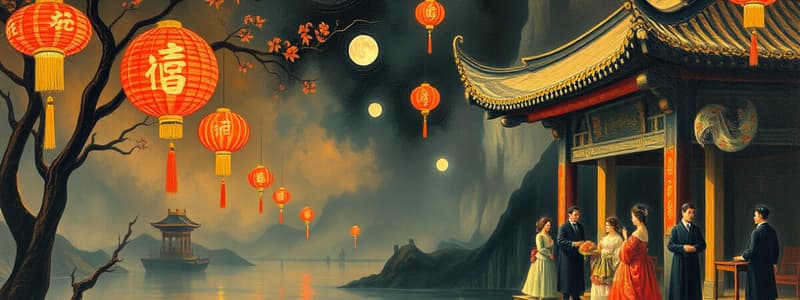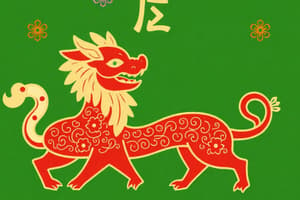Podcast
Questions and Answers
What is the last day of the Chinese New Year celebrations called?
What is the last day of the Chinese New Year celebrations called?
- Spring Festival
- Lantern Festival (correct)
- Lantem Festival
- Dragon Festival
Chinese New Year's Day occurs between January 21st and February 20th each year.
Chinese New Year's Day occurs between January 21st and February 20th each year.
True (A)
What do children receive from their older relatives during the Chinese New Year?
What do children receive from their older relatives during the Chinese New Year?
money
Many people believe that not eating ______ on Chinese New Year's Day will bring them a long life.
Many people believe that not eating ______ on Chinese New Year's Day will bring them a long life.
Match the following Chinese New Year traditions with their significance:
Match the following Chinese New Year traditions with their significance:
Flashcards are hidden until you start studying
Study Notes
Overview of Chinese New Year
- Chinese New Year is the most significant holiday in China, also known globally as the Lunar New Year.
- Celebrations occur worldwide, transcending geographical boundaries.
Timing and Duration
- Begins on the first day of the first lunar month in the Chinese calendar.
- Concludes on the 15th day with the Lantern Festival, marking an additional celebration.
Date Variability
- Date varies each year, falling between January 21 and February 20.
- Determined by the Chinese zodiac, depending on the animal of the year (e.g., dragon, rat, horse, dog).
- There may be discrepancies regarding the specific year among scholars.
Traditions and Customs
- First day involves welcoming various gods into homes, showcasing reverence and cultural rituals.
- Multiple superstitions dictate behaviors on this day; for example:
- Avoiding meat consumption is believed to promote longevity.
- Lighting fires is considered unlucky, leading to pre-cooking meals.
- Other activities associated with bad luck include getting a haircut, sweeping the floor, and buying books.
Family Significance and Festivities
- Family visits are paramount, fostering connection and unity.
- Children enjoy this day due to receiving money from older relatives, enhancing festive spirits.
- Homes are adorned with red lanterns, symbolizing good luck and prosperity.
- Traditional foods are prepared and shared as part of the celebrations.
Celebratory Atmosphere
- The holiday features a lively atmosphere marked by the sounds of firecrackers and fireworks in the streets, signifying joy and festivity.
Studying That Suits You
Use AI to generate personalized quizzes and flashcards to suit your learning preferences.




